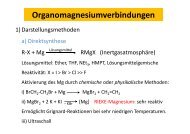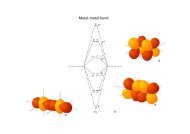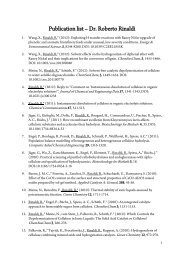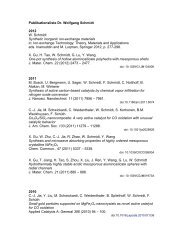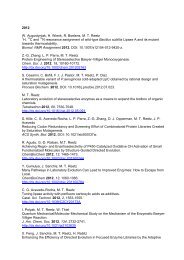- Page 1: Printed May 2005 Max-Planck-Institu
- Page 4 and 5: External Scientific Members of the
- Page 6 and 7: 2.2 Department of Homogeneous Catal
- Page 9: CHAPTER 1 The Max-Planck-Institut f
- Page 12 and 13: 12 History titanium or zirconium le
- Page 14 and 15: 14 Current Research Areas 1.2 Curre
- Page 16 and 17: 16 1.3 Organigram in the Middle of
- Page 18 and 19: 18 Members of the Board of Governor
- Page 21 and 22: Director: Synthetic Organic Chemist
- Page 23 and 24: Synthetic Organic Chemistry 1992-19
- Page 25 and 26: Synthetic Organic Chemistry - Overv
- Page 27 and 28: Synthetic Organic Chemistry - M. T.
- Page 29 and 30: Synthetic Organic Chemistry - M. T.
- Page 31 and 32: Synthetic Organic Chemistry - M. T.
- Page 33 and 34: Synthetic Organic Chemistry - M. T.
- Page 35 and 36: Synthetic Organic Chemistry - M. T.
- Page 37 and 38: Synthetic Organic Chemistry - M. T.
- Page 39 and 40: Synthetic Organic Chemistry - M. T.
- Page 41 and 42: Synthetic Organic Chemistry - G. Fi
- Page 43 and 44: Synthetic Organic Chemistry - G. Fi
- Page 45 and 46: Synthetic Organic Chemistry - G. Fi
- Page 47: Synthetic Organic Chemistry - G. Fi
- Page 51 and 52: Synthetic Organic Chemistry - L. J.
- Page 53 and 54: Synthetic Organic Chemistry - M. W.
- Page 55 and 56: Synthetic Organic Chemistry - M. W.
- Page 57 and 58: Ph2P Pd PPh2 X 33: X = Cl 34: X = B
- Page 59 and 60: Synthetic Organic Chemistry - W. Le
- Page 61 and 62: Synthetic Organic Chemistry - W. Le
- Page 63 and 64: Director: NN Further group leaders:
- Page 65 and 66: Homogeneous Catalysis - K. Jonas 2.
- Page 67 and 68: Cp* δ Co(III) + achiral 5 Cp* δ C
- Page 69 and 70: Homogeneous Catalysis - K. Jonas DF
- Page 71 and 72: Homogeneous Catalysis - K. Jonas Of
- Page 73 and 74: Homogeneous Catalysis - B. List 2.2
- Page 75 and 76: Homogeneous Catalysis - B. List 2.2
- Page 77 and 78: Homogeneous Catalysis - B. List 2.2
- Page 79 and 80: Homogeneous Catalysis - B. List In
- Page 81 and 82: Homogeneous Catalysis - K.-R. Pörs
- Page 83 and 84: Homogeneous Catalysis - K.-R. Pörs
- Page 85 and 86: Director: Ferdi Schüth (born 1960)
- Page 87 and 88: Heterogeneous Catalysis 1998- Chair
- Page 89 and 90: Heterogeneous Catalysis - Overview
- Page 91 and 92: Heterogeneous Catalysis - F. Schüt
- Page 93 and 94: Heterogeneous Catalysis - F. Schüt
- Page 95 and 96: Heterogeneous Catalysis - F. Schüt
- Page 97 and 98: Heterogeneous Catalysis - F. Schüt
- Page 99 and 100:
Heterogeneous Catalysis - F. Schüt
- Page 101 and 102:
Heterogeneous Catalysis - F. Schüt
- Page 103 and 104:
Heterogeneous Catalysis - F. Schüt
- Page 105 and 106:
Heterogeneous Catalysis - H. Bönne
- Page 107 and 108:
Heterogeneous Catalysis - S. Kaskel
- Page 109 and 110:
Heterogeneous Catalysis - F. Marlow
- Page 111 and 112:
Heterogeneous Catalysis - F. Marlow
- Page 113 and 114:
Director: Alois Fürstner (born 196
- Page 115 and 116:
Organometallic Chemistry 2002- Memb
- Page 117 and 118:
Organometallic Chemistry - Overview
- Page 119 and 120:
Organometallic Chemistry - A. Fürs
- Page 121 and 122:
O O OH O O Amphidinolide T1 HO O O
- Page 123 and 124:
Organometallic Chemistry - A. Fürs
- Page 125 and 126:
RCAM/ Lindlar Organometallic Chemis
- Page 127 and 128:
Organometallic Chemistry - A. Fürs
- Page 129 and 130:
Organometallic Chemistry - A. Fürs
- Page 131 and 132:
Organometallic Chemistry - A. Fürs
- Page 133 and 134:
Organometallic Chemistry - A. Fürs
- Page 135 and 136:
Organometallic Chemistry - F. Glori
- Page 137 and 138:
Organometallic Chemistry - F. Glori
- Page 139 and 140:
Director: Walter Thiel (born 1949)
- Page 141 and 142:
Theory - Overview Research in the D
- Page 143 and 144:
Theory - W. Thiel 2.5.1 Research Ar
- Page 145 and 146:
Theory - W. Thiel matrices. The ado
- Page 147 and 148:
Theory - W. Thiel 2.5.2 Research Ar
- Page 149 and 150:
Theory - W. Thiel Further collabora
- Page 151 and 152:
Theory - W. Thiel with CASPT2 refer
- Page 153 and 154:
Theory - W. Thiel 2.5.4 Research ar
- Page 155 and 156:
Theory - W. Thiel Cytochrome P450ca
- Page 157 and 158:
Theory - K. Angermund 2.5.5 Researc
- Page 159 and 160:
Theory - M. Bühl 2.5.6 Research Ar
- Page 161 and 162:
Theory - M. Bühl one of the metal
- Page 163 and 164:
CHAPTER 3 Scientific Service Units
- Page 165 and 166:
Scientific Service Units - Overview
- Page 167 and 168:
Scientific Service Units - Chromato
- Page 169 and 170:
Scientifc Service Units - Mass Spec
- Page 171 and 172:
Scientifc Service Units - Nuclear M
- Page 173 and 174:
Scientific Service Units - Chemical
- Page 175 and 176:
Scientific Service Units - Electron
- Page 177 and 178:
Scientific Service Units - Library
- Page 179 and 180:
Scientific Service Units - Computer
- Page 181 and 182:
CHAPTER 4 The Training of Young Sci
- Page 183 and 184:
The Training of Young Scientists 4
- Page 185 and 186:
The Training of Young Scientists Aa
- Page 187 and 188:
The Training of Young Scientists Le
- Page 189 and 190:
The Training of Young Scientists Ka
- Page 191 and 192:
CHAPTER 5 Technology Transfer 191
- Page 193 and 194:
Technology Transfer 5 Technology Tr
- Page 195 and 196:
CHAPTER 6 Special Events and Activi
- Page 197 and 198:
Special Events and Activities 6 Spe
- Page 199 and 200:
Special Events and Activities Berli
- Page 201 and 202:
Special Events and Activities Visit
- Page 203 and 204:
CHAPTER 7 Appendices 203
- Page 205 and 206:
Appendices - List of Publications 7
- Page 207 and 208:
Appendices - List of Publications 3
- Page 209 and 210:
Appendices - List of Publications 7
- Page 211 and 212:
Appendices - List of Publications 1
- Page 213 and 214:
Appendices - List of Publications 1
- Page 215 and 216:
Appendices - List of Publications 1
- Page 217 and 218:
Appendices - List of Publications 2
- Page 219 and 220:
Appendices - List of Publications 2
- Page 221 and 222:
Appendices - List of Publications 2
- Page 223 and 224:
Appendices - List of Publications 3
- Page 225 and 226:
Appendices - List of Publications 3
- Page 227 and 228:
Appendices - List of Publications 3
- Page 229 and 230:
Appendices - List of Publications 4
- Page 231 and 232:
Appendices - List of Invited Talks
- Page 233 and 234:
Appendices - List of Invited Talks
- Page 235 and 236:
Appendices - List of Invited Talks
- Page 237 and 238:
Appendices - List of Invited Talks
- Page 239 and 240:
Appendices - List of Invited Talks
- Page 241 and 242:
Appendices - List of Invited Talks
- Page 243 and 244:
Appendices - List of Invited Talks
- Page 245 and 246:
Appendices - List of Invited Talks
- Page 247 and 248:
Appendices - Scientific Honors, Lec
- Page 249 and 250:
Appendices - Contacts with Universi
- Page 251 and 252:
Appendices - List of Talks Given by
- Page 253 and 254:
Appendices - List of Talks Given by
- Page 255 and 256:
Appendices - List of Talks Given by
- Page 257 and 258:
Appendices - Alexander von Humboldt
- Page 259 and 260:
Appendices - Local Activities of th
- Page 261:
Duisburg A40 A524 HOW TO REACH THE



